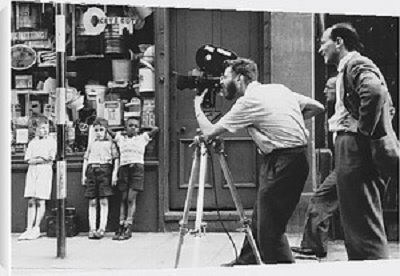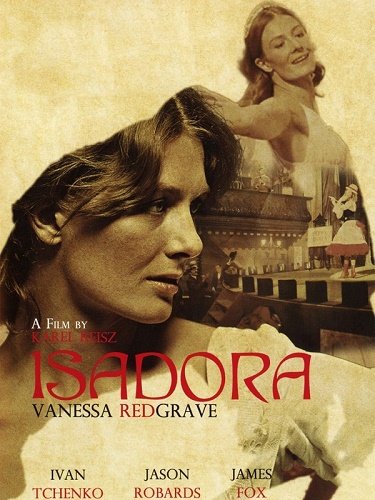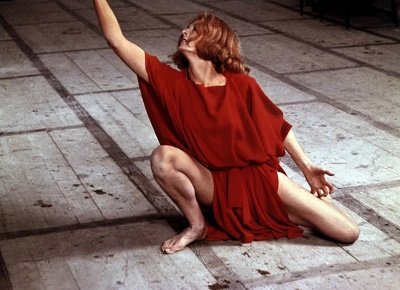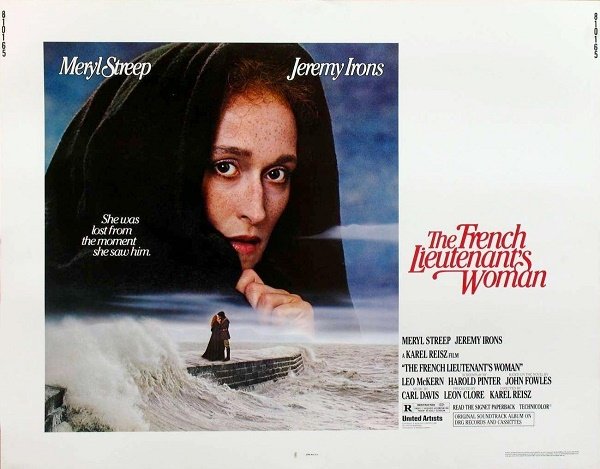Karel Reisz: el cine romántico de un postromántico
Se recordaba en estos días la fecha de fallecimiento –25 de noviembre de 2002– del cineasta británico de origen checoslovaco Karel Reisz. Quizás para muchos su nombre no les diga nada, pero para cinéfilos como yo tiene una particular significación, pues dejó huellas en mi formación con dos de sus filmes: Isadora y La amante del teniente francés, a las que me referiré más adelante.
It was remembered these days the date of death -November 25, 2002- of the British filmmaker of Czechoslovakian origin Karel Reisz. Perhaps for many his name means nothing, but for film buffs like me it has a particular significance, since he left his mark on my education with two of his films: Isadora and The French lieutenant's mistress, to which I will refer later.

Como podrá leerse de su biografía en la fuente indicada, la infancia de Reisz está marcada por dos hechos impactantes: siendo de raíz judía, tuvo que convertirse en refugiado en tiempos del nazismo, sus padres murieron en el campo de concentración de Auschwitz y él estuvo entre los 668 niños judíos que fueron salvados de la muerte a manos de los nazis en 1939, gracias a la solidaria acción de Nicholas Witon.
En el año 1956 fundó en Inglaterra el movimiento que se conoce como Free Cinema, en el que, al lado de los cineastas Lindsay Anderson y Tony Richardson, se propone una estética cinematográfica despojada de la artificialidad y frivolidad de Hollywood y que reivindica cierto realismo en la realización ficcional.
As can be read in his biography in the indicated source, Reisz's childhood is marked by two shocking facts: being of Jewish roots, he had to become a refugee in Nazi times, his parents died in the Auschwitz concentration camp and he was among the 668 Jewish children who were saved from death at the hands of the Nazis in 1939, thanks to the solidary action of Nicholas Witon.
In 1956 he founded in England the movement known as Free Cinema, in which, together with the filmmakers Lindsay Anderson and Tony Richardson, it proposed a cinematographic aesthetic stripped of the artificiality and frivolity of Hollywood and which vindicates a certain realism in the fictional realization.
Como indiqué, dos obras de Reisz tienen un lugar muy significativo para mí, en las que puedo observar hoy – quizás ese fue el principal rasgo que apenas intuí entonces– una visión romántica, en uno de los sentidos originarios del término, que refiere al individuo fuera de la conducta y moral normadas y establecidas como “correctas”, pero tratadas desde la perspectiva de un hombre postromántico, pues los filmes son del avanzado siglo XX. Aludo a sus filmes Isadora y La amante del teniente francés.
As I indicated, two works by Reisz have a very significant place for me, in which I can observe today -perhaps that was the main feature that I barely intuited then- a romantic vision, in one of the original senses of the term, which refers to the individual outside the normed and established conduct and morals as "correct", but treated from the perspective of a post-Romantic man, since the films are from the advanced 20th century. I allude to his films Isadora and La amante del teniente francés.

Isadora es un filme de 1968, que pudimos ver muchos años después, gracias a la labor alternativa de los cine clubes. Es un filme de ficción en el que aborda la biografía de la danzarina y coreógrafa estadounidense Isadora Duncan, considerada la iniciadora de la danza moderna, interpretada por la gran actriz Vanessa Redgrave, y con participación de actores como Jason Robards y James Fox.
A partir de la adaptación de la autobiografía Mi vida de Duncan, Reisz nos entrega la vida gloriosa y dramática, hasta su trágica muerte, de esta mujer que fue hito en el desarrollo del arte moderno. Quien experimentara su arte y su vida (amorosa, en particular) desde la búsqueda de la libertad, poniendo en lugar el cuerpo y sus emociones, termina en una muerte absurda. Quizás fue mi primer encuentro audiovisual con la tragedia del artista.

Isadora* is a 1968 film, which we could see many years later thanks to the alternative work of film clubs.It is a fiction film that deals with the biography of the American dancer and choreographer Isadora Duncan, considered the initiator of modern dance, played by the great actress Vanessa Redgrave, and with the participation of actors like Jason Robards and James Fox.
Based on the adaptation of Duncan's autobiography My Life, Reisz gives us the glorious and dramatic life, until her tragic death, of this woman who was a milestone in the development of modern art. Who experienced her art and her life (love life, in particular) from the search for freedom, putting her body and her emotions in place, ends in an absurd death. Perhaps it was my first audiovisual encounter with the tragedy of the artist.
La amante del teniente francés es una realización de 1981, y esta sí la pudimos ver en una sala de cine comercial. Se basa en la novela homónima de John Fowles, en la que se nos narra el drama de una mujer discriminada por la sociedad inglesa victoriana (segunda mitad del siglo XIX) por haber tenido un amorío con un oficial militar francés que la abandonara, y ahora es nuevamente juzgada por el acercamiento amoroso con un investigador que quiere ayudarla.
El filme recibió varias nominaciones y premios en su momento, tanto por la protagonización a cargo de la muy laureada Meryl Streep y Jeromy Irons, como por su realización, entre otras elementos. Considero que es un filme de un talante romántico indiscutible, no solo porque se trate de una relación amorosa dramática y fallida, el significado más inmediato que suele dársele a lo “romántico”, sino, especialmente, por la significación de este personaje femenino al margen, preterido y acosado por la sociedad. Es muy interesante, en la adaptación hecha por Harol Pinter, el tránsito entre la historia de "La mujer del teniente francés" y la relación entre los actores durante la filmación, ambas ficcionales.

The French Lieutenant's Mistress was made in 1981, and we were able to see it in a commercial theater. It is based on the novel of the same name by John Fowles, which narrates the drama of a woman discriminated against by Victorian English society (second half of the 19th century) for having had an affair with a French military officer who abandoned her, and now she is again judged for her amorous approach with an investigator who wants to help her.
The film received several nominations and awards at the time, both for the starring role played by Meryl Streep and Jeromy Irons, as well as for its direction, among other elements. I consider it a film with an indisputable romantic mood, not only because it is about a dramatic and failed love relationship, the most immediate meaning usually given to the "romantic", but especially for the significance of this female character on the sidelines, preterited and harassed by society. It is very interesting, in the adaptation made by Harol Pinter, the transition between the story of "The French lieutenant's wife" and the relationship between the actors during the filming, both fictional. En las fuentes indicadas en el texto | In the sources indicated in the text.Referencias:
Para más consultas sobre ambos filmes, ir a 1 y 2. | For more information on both films, go to 1 and 2.
Gracias por su lectura. Thank you for reading.



No estoy seguro si llegué a ver Isadora. La amante del teniente francés si. Esos dos actores, Jeremy Irons y Meryl Streep, se lucen en sus actuaciones. Ambos estaban en un gran momento. Gracias por traernos estás publicaciones que contribuyen a conocer el mundo del cine. Que estés bien. Un fuerte abrazo desde Maracay.
Gracias a ti por tu visita y comentario, apreciado @irvinc. Saludos.
Enhorabuena. Has recibido apoyo
The Creative Coin Fund.
Únete al servidor de Creative Coin y comparte tus publicaciones.
Congratulations. You have received support from The Creative Coin Fund.
Join the Creative Coin server and share your posts.
Selección manual de @jesuspsoto
|
Image by barbara-orenya
#posh
https://twitter.com/jorma08/status/1464447159202373639?s=20
@josemalavem! The Hive.Pizza team manually curated this post.
PIZZA Holders sent $PIZZA tips in this post's comments:
You can now send $PIZZA tips in Discord via tip.cc!